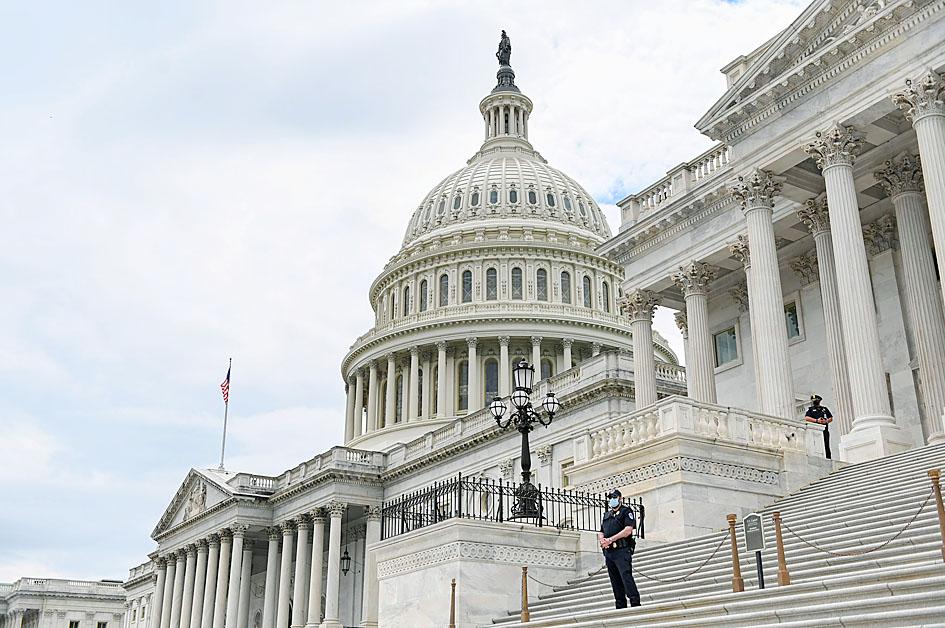The US House of Representatives Armed Services Committee yesterday passed its version of the US annual defense policy bill — the National Defense Authorization Act for fiscal year 2023 — which includes provisions for enhancing military ties with Taiwan.
The committee passed the draft bill in a 57-to-one vote early in the morning, following 16 hours of debate.
A draft of the bill released by US Representative Adam Smith on Monday said it would reiterate that the Taiwan Relations Act and the “six assurances” form the cornerstone of Taiwan-US relations.

Photo: Reuters
Beijing’s rising hostility toward Taipei contravenes the principle that the future of Taiwan must be resolved peacefully, it said.
Washington must maintain capabilities to “resist any resort to force or other forms of coercion that would jeopardize the security, or the social or economic system, of the people of Taiwan,” a resolution attached to the bill said.
The US should continue a policy to “make available to Taiwan such defense articles and defense services in such quantities as may be necessary to enable Taiwan to maintain a sufficient self-defense capability,” it said.
The bill also called for exchanges among defense officials from the two countries, joint military training and exercises, and timely evaluations of Taiwan’s defense and acquisition strategy.
Separately, the lawmakers also supported the US Department of Defense using war games to clarify the strategy of the Indo-Pacific Command, and asked that the US secretary of defense brief the committee on the simulations and their implications before March 15 next year.
Additionally, the defense secretary was asked to brief the committee before March 1 on the state of Taiwan’s air defenses, including its capabilities, interoperability and plans for hastening its development, they said.

INVESTIGATION: The case is the latest instance of a DPP figure being implicated in an espionage network accused of allegedly leaking information to Chinese intelligence Democratic Progressive Party (DPP) member Ho Jen-chieh (何仁傑) was detained and held incommunicado yesterday on suspicion of spying for China during his tenure as assistant to then-minister of foreign affairs Joseph Wu (吳釗燮). The Taipei District Prosecutors’ Office said Ho was implicated during its investigation into alleged spying activities by former Presidential Office consultant Wu Shang-yu (吳尚雨). Prosecutors said there is reason to believe Ho breached the National Security Act (國家安全法) by leaking classified Ministry of Foreign Affairs information to Chinese intelligence. Following interrogation, prosecutors petitioned the Taipei District Court to detain Ho, citing concerns over potential collusion or tampering of evidence. The

‘FORM OF PROTEST’: The German Institute Taipei said it was ‘shocked’ to see Nazi symbolism used in connection with political aims as it condemned the incident Sung Chien-liang (宋建樑), who led efforts to recall Democratic Progressive Party (DPP) Legislator Lee Kun-cheng (李坤城), was released on bail of NT$80,000 yesterday amid an outcry over a Nazi armband he wore to questioning the night before. Sung arrived at the New Taipei City District Prosecutors’ Office for questioning in a recall petition forgery case on Tuesday night wearing a red armband bearing a swastika, carrying a copy of Adolf Hitler’s Mein Kampf and giving a Nazi salute. Sung left the building at 1:15am without the armband and apparently covering the book with a coat. This is a serious international scandal and Chinese

Seventy percent of middle and elementary schools now conduct English classes entirely in English, the Ministry of Education said, as it encourages schools nationwide to adopt this practice Minister of Education (MOE) Cheng Ying-yao (鄭英耀) is scheduled to present a report on the government’s bilingual education policy to the Legislative Yuan’s Education and Culture Committee today. The report would outline strategies aimed at expanding access to education, reducing regional disparities and improving talent cultivation. Implementation of bilingual education policies has varied across local governments, occasionally drawing public criticism. For example, some schools have required teachers of non-English subjects to pass English proficiency

TRADE: The premier pledged safeguards on ‘Made in Taiwan’ labeling, anti-dumping measures and stricter export controls to strengthen its position in trade talks Products labeled “made in Taiwan” must be genuinely made in Taiwan, Premier Cho Jung-tai (卓榮泰) said yesterday, vowing to enforce strict safeguards against “origin laundering” and initiate anti-dumping investigations to prevent China dumping its products in Taiwan. Cho made the remarks in a discussion session with representatives from industries in Kaohsiung. In response to the US government’s recent announcement of “reciprocal” tariffs on its trading partners, President William Lai (賴清德) and Cho last week began a series of consultations with industry leaders nationwide to gather feedback and address concerns. Taiwanese and US officials held a videoconference on Friday evening to discuss the